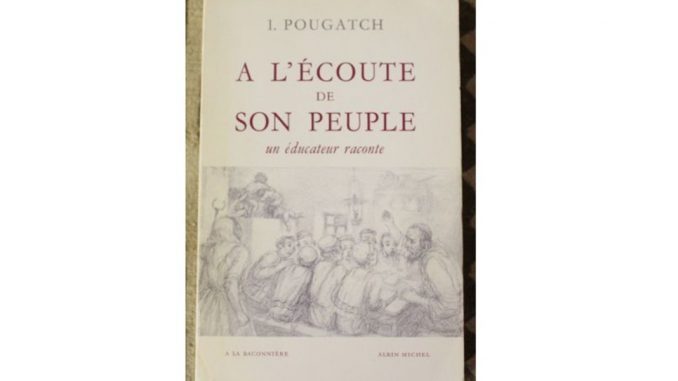
We have chosen two authors who recall with nostalgia the celebration of the feast of Purim in their respective villages.
In his book of memories : ” A l’écoute de mon peuple ” published by Albin Michel, Isaac Pougatch describes what was the day of Purim in Braguine. Here is this brief excerpt:
“Purim: the victory of Mordecai the Righteous over the infamous Haman. A gift at the end of winter much appreciated by the Jews of the village. It does not matter that the event commemorated would have taken place in vague and distant Persia around the 6th century BC.
At the Shtettl, the jubilation was great. Do not Mordecai and Haman clash in all the centuries? And wasn’t Haman a descendant of that treacherous Amalek who had attacked the Hebrews in the desert as they were heading for the Promised Land? Like his great-great-grandfather, he was struck by lightning, a victim of his stupid pride. Just think! Forcing Mordecai to bend his knee before a mere mortal, while the Jewish people knelt only before G.od… And its intrigues then! His slanders aimed, at the beginning, at Mordecai alone, to spread very quickly to the entire Jewish population, whose loss he swore in the end… All this was all too well known, too familiar to the shtettl. All this was all too well known, too familiar to the shtettl. To be convinced of this, it was enough to hear the accounts of the rare travelers who read the newspapers of Moscow, Saint Petersburg and Kiev…
In Purim, people were not unemployed, but who had their heart at work – and even at study – the day they escaped such a pogrom? We gave to the poor, we sent each other sweets (always the same ones) essentially Pourimesque: triangular cakes filled with poppy seeds or jam, almonds and hazelnuts with honey in diamond shapes.
On the evening of the closing night, every house was filled with the feast that reminded one of the feast that the Jews of Persia had enjoyed once the danger had passed. Groups of young men, improvised actors, dressed in costumes that were meant to be biblical, went from house to house, entertaining the guests by reenacting episodes from Genesis, such as the sacrifice of Abraham or Joseph sold by his brothers … As we can see, the celebration of such events of the past did not make us forget all the others…
For Elie Wiesel, this theme of Purim is the subject of his book “The Trial of Shamgorod” as it took place on February 25, 1649.
It is a play, what is more exactly called a “Purim shpil”.
Let’s open a small parenthesis to explain exactly what the Purim shpil or the Jewish carnival is.
At the origin of the Jewish theater, there is the tradition of the Purim shpil, these plays interpreted during the festival of the Spells which recalls the rescue of the Jews by Queen Esther at the time of the Persian king Ahasuerus. Purim is the Jewish carnival, marked by laughter, disguise and derision.
One of the highlights of this festival is the performance of the Game of Purim in which a religious dimension is intertwined – it is a Yiddish-language extension of the liturgy – theatrical – it is a staging of the sacred text – and carnivalesque – we are in the world of burlesque farce and speech in the manner of the Commedia dell’arte. The Pourim shpil allows us to understand what the Jewish comic “popular” culture was.
Let’s go back to Elie Wiesel: “On this day of Purim, three travelling actors came to the hostel to entertain the community. Purim is the feast where the madmen are crowned, where children and beggars are kings. It’s a festival of masks, where everyone yearns for change. The feast of non-knowledge. Doesn’t tradition say that one must drink and drink again “until one loses consciousness and knowledge, until one is no longer able to distinguish between good and evil, between Mordecai the just and Haman the ungodly, between light and shadow, between life and death”?
…..When I think of the Purim festival, I think of the masks we wore. We were children in our little town and in Purim we played. We went from door to door collecting money for the poor . I thought about Purim especially later, when I began to wonder about the meaning of miracles and the need for feasts in Judaism.
It used to be a very joyful celebration. Today, we no longer know what joy is. In my childhood, it was a mitzvah to get drunk. The traditional saying that at the end of time, only the feast of Purim remains is, it seems to me, an irony.
It is the humor of Judaism which thus wants to emphasize laughter, which occupies an important place in our thinking and in our history. It is as if we say that when the Messiah comes, he will laugh with us.
Let us leave Purim in its right place, it is an ambiguous feast, a won battle, but not a won war, it is a provisional victory of the forces of life against the forces of death.

Be the first to comment